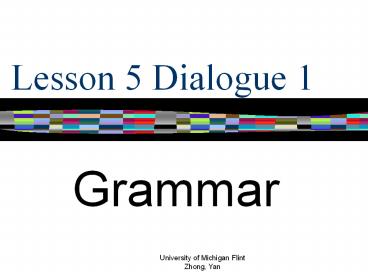Lesson 5 Dialogue 1 - PowerPoint PPT Presentation
Title:
Lesson 5 Dialogue 1
Description:
Lesson 5 Dialogue 1 Grammar University of Michigan Flint Zhong, Yan (y xi ) & ( ) ({y } di nr) Moderating the Tone of Voice Following a verb, both ... – PowerPoint PPT presentation
Number of Views:491
Avg rating:3.0/5.0
Title: Lesson 5 Dialogue 1
1
Lesson 5 Dialogue 1
- Grammar
2
?? (yí xià) (?)?? (yì dianr) Moderating the
Tone of Voice
3
Following a verb, both ?? (yí xià, lit. once)
and (?)?? (yì dianr a bit) can soften the
tone in a question or an imperative sentence,
therefore making it more polite.
4
- ?? (yí xià)
- (?)?? (yì dianr)
- modifies the verb
- ????,???????Ni kàn yí xià, zhè shì shéi de
zhàopiàn? (Take a look. Whose photo is this?) - ??????Ni jìn lai yí xià. (Come in for a minute.)
- modifies the object
- ???????? Ni xiang chi dianr shénme? (What would
you like to eat?) - ????????Ni he yìdianr chá ba. (Have a little tea.)
5
Adjectives as Predicates
6
In Chinese, when an adjective functions as a
predicate, it is not preceded by the verb ? (shì,
to be). It is usually modified by ? (hen, very)
7
Im happy today.
- ???????
- Wo jintian hen gaoxìng.
8
His younger sister is pretty.
- ???????
- Ta mèimei hen piàoliang.
9
That movie is good.
- ???????
- Nà ge diànying hen hao.
10
However, ? (hen) is not as strong as very in
English. When forming a question with an
adjective as the predicate, ? is not used.
11
- A ??????Ni dìdi gao ma? (Is your younger brother
tall?) - B ????Ta hen gao. (He is tall.)
12
- A ?????Ni jia dà ma? (Is your house big?)
- B ????,???Wo jia bú dà, hen xiao. (My house is
not big, its small.)
13
Chinese adjectives without ? (hen) or any sort of
modifier before them can often imply comparison
or contrast.
14
- A ???????????Jiejie piàoliang háishi mèimei
piàoliang? (Whos prettier, the older sister or
the younger sister?) - B ?????Mèimei piàoliang. (The younger sister is
prettier).
15
My younger sisters Chinese is good. My Chinese
is not good.
- ??????,???????
- Mèimei de Zhongwén hao, wo de Zhongwén bù hao.
16
The Preposition ? (zài, at in on)
Combined with a noun, the preposition ? (zài)
indicates location. When the phrase is placed
before a verb, it indicates the location of the
action.
17
- A ???????
- Wo de shu zài nar?
- Where is my book?
- B ????
- Zài nàr.
- Its over there.
18
- A ???????
- N i zài nar gongzuò ?
- Where do you work?
- B???????
- Wo zài zhèr gongzuò.
- I work here.
19
I study Chinese at this university.
- ??????????
- Wo zài zhè ge dàxué xué Zhongwén.
20
I dont like to watch movies at home.
- ??????????
- Wo bù xihuan zài jia kàn diànying.
21
The Particle ? (ba)
? (ba) is a sentence-fi nal suggestion
particle, often used at the end of an imperative
sentence to soften the tone.
22
Why dont you have some coffee?
- ??????
- Ni he kafei ba.
23
Come in, please.
- ?????
- Qing jìn lai ba.
24
Lets dance.
- ??????
- Women tiào wu ba.
25
?? (Shì ma?) is not a question
Although it takes a question mark, ?? (Shì ma?)
is not a question here but a mild expression of
surprise on hearing something unexpected. Here
it indicates ones modesty on receiving a
compliment. It could be translated as Is that
so? You don't say! or Really?
26
- ?????,?????
- Nimen jia hen dà, ye hen piàoliang.
- ???
- Shì ma?
27
?? narwhere a question word Do not confuse it
with
- ??
- Nàr
- there
- ??
- Zhèr
- here
28
??
- ??































